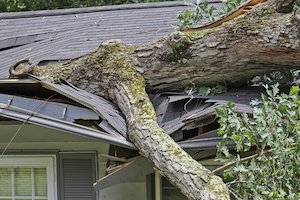A Guide to Fallen Trees and Insurance Claims

Your neighbor’s tree falls on your house or car. Or it’s your tree and your neighbor’s house or car. Or maybe the tree doesn’t fall, but a storm blows a branch through your window. Your tree, your problem? Your neighbor’s tree, their problem? A tree may have fallen, but where the liability falls isn’t always so obvious. Dealing with fallen trees and insurance claims can be confusing This article will help clear things up.
Who Pays for Fallen Trees and Resultant Costs? It Depends
There are three factors that affect insurance coverage for fallen trees in a standard homeowner’s insurance policy:
- Where the tree was. Your yard, your neighbor’s yard or on public property
- Why the tree fell. Wind, a storm, a flood or just age or condition
- What was damaged. Your home, an outbuilding (such as a shed) or your car
Here are some common situations:
A tree, either yours or your neighbor’s, falls and nothing is damaged
According to the Insurance Information Institute (III), your policy probably won’t cover debris removal. However, if the tree fell because of neglect, such as rot or disease, the tree’s owner may be liable. (More on this below.) If the tree blocks a ramp for the disabled or a driveway, insurance may pay for removal.
A tree falls because of a storm or wind and damages a structure, fence or other property
For most policies, storms or wind are “named perils.” Regardless of whether the tree was yours or not, the insurance company that insured the damaged property would pay. In that case, debris removal would also be covered. Such coverage for tree removal typically ranges from $500 to $1,000, depending on the insurance provider and policy terms.
A tree falls on a vehicle
Coverage, if any, would come from the auto insurer, not the homeowner’s policy, assuming the auto policy includes comprehensive coverage. (Some owners opt to purchase only liability insurance.).
The above also rules apply if branches, and not an entire tree, caused the damage.
Contents of the damaged structure would be covered as well, subject to policy limits. And since trees, plants and shrubs have value, insurance may cover replacement, again subject to policy limits. (Most policies cap this coverage at 5% of the amount of coverage on the structure.)
Trees and Insurance: What’s Covered
Typically, policies cover damage to trees and shrubs caused by disasters or accidents, including fire, lightning, explosion, theft, aircraft, vehicles not owned by the resident, vandalism and malicious mischief.
Note that damage caused by floods, earthquakes or hurricanes may carry higher deductibles or not be covered at all. This often varies by state; additional insurance is worth considering.
If your home has high-value trees, shrubs or plants, ask your insurance broker/agent about additional coverage.
When the Owner of the Fallen Tree Matters
If the tree that damages your property was your neighbor’s, your insurance company may try to collect from their insurance company. This is called subrogation. If your insurer is successful, you may be reimbursed for your deductible.
Remember, if a tree is rotting, diseased or otherwise in danger of falling, or branches are in danger of falling, the owner could be liable if they do nothing to correct the situation. If a tree on your neighbor’s property looks as if it could fall on your property at any moment, send a letter with photos to your neighbor, detailing the issue. If your neighbor refuses to do anything, you may want to consider hiring a lawyer. If not, having documentation that you notified your neighbor of the potential liability could make your neighbor liable (and ultimately reimburse you for your deductible).
Lastly, consider your deductible. If a tree damages your fence and the cost to repair the fence and remove the tree is only a little more than your deductible, you may want to consider whether filing a claim makes sense.
If you have any questions about insurance or your current insurance policy, or would like a free insurance review, please call us at 877-576-5200.


